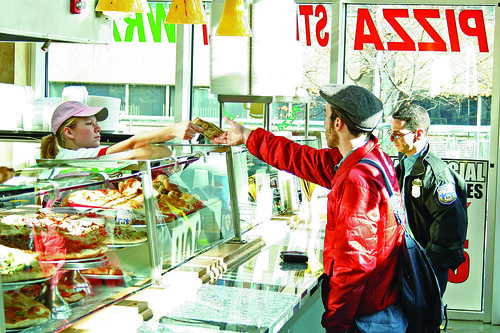“Everything went up. Paper cups went up. What is with that?” said Robin Cola, the owner of Maxi’s on Liacouras Walk.
Cola described business as “strange.”
She said customers who are coming in aren’t spending as much as they once did because of layoffs and parents not giving a lot of money to their kids.
Slow days coupled with a limping economy have created problems for Cola, but she said the increasing costs for ingredients are a bigger problem.

Bags of flour at Maxi’s used to cost $8.99 last semester. During the summer the price climbed to $40. Kegs that sold for $50 or $120 now cost Cola nearly $40 more.
“All the prices have gone up. Over the summer, flour went up 300 percent,” said Pete Borgmann, day manager at Maxi’s.
Despite the old adage that alcohol is recession-proof, the effects of the economy have increased the price of alcoholic beverages.
“We had to raise the price of Guinness by a quarter, but five bucks for a Guinness is still pretty good,” Borgmann said.
Drink specials are now offered every night along with Sunday’s $1 draft offer. Cola has lowered the price of specialty slices to that of plain ones and offers 20 buffalo wings for $5. She had to cut cashiers’ hours and has found herself working longer to compensate.
Monica Dotto, manager at the Chop Shop on Liacouras Walk, has seen how the effects of the economy have affected sales at her store.
“The utility bill [and] hair products have all gone up $3, but that is at the very least,” Dotto said.
The Chop Shop raised the prices on all its cuts and styling by $5. Dotto said the store still offers the $10 haircut.
Tips from customers have also gone down because the price of styles has gone up. Dotto said she understands students are already living on a budget.
The food trucks along the streets near Main Campus are paying for the problems in the economy out of their own pockets.
Selin Zeka, who has helped run the Sexy Green Truck for more than two years, is experiencing fewer profits and higher costs for foods.
Zeka said he has seen a huge difference between this year and last year because of the economy.
Last year, Zeka could purchase boxes of lettuce heads for $14.
This semester, he paid $25 to $32, depending on the season.
“I can’t raise my prices because students can’t afford it. We are just hanging in there and hoping for better. Something has to change soon,” he said.
Students who are already in debt from paying tuition often take on jobs to counter other costs associated with college living.
Part-time jobs have taken a hit across the country as opportunities in the workforce for recent college graduates aren’t available in many fields.
Anton Kopylov, a senior criminal justice major, was laid off from his job at a car dealership in Langhorne, Pa., along with about 60 other employees.
“The automotive sector is horrible now anyway, they are all shifting to alternative fuels and after that happens I expect a rebound,” Kopylov said.
While he was employed, the price of gas was a problem for Kopylov. He started to limit the nights he would go out.
Junior communications major Brett Snell said he saw his student loan totals decrease by $700 since last year. He had to take out a second loan from another lender.
Snell worked long hours during the summer to earn enough money to last through the fall and spring semesters.
He said he has seen his funds depleting much quicker and is contemplating finding a job now.
“I’m trying to cut back on the cigarettes, too,” Snell said. “I’m broke.”
His gas bill has gone up, and he has to pay monthly installments into a security deposit and utilities.
“I haven’t even been able to think about big purchases,” he said. “It’s not even an option.”
Greg Adomaitis can be reached at greg.adomaitis@temple.edu.



Be the first to comment